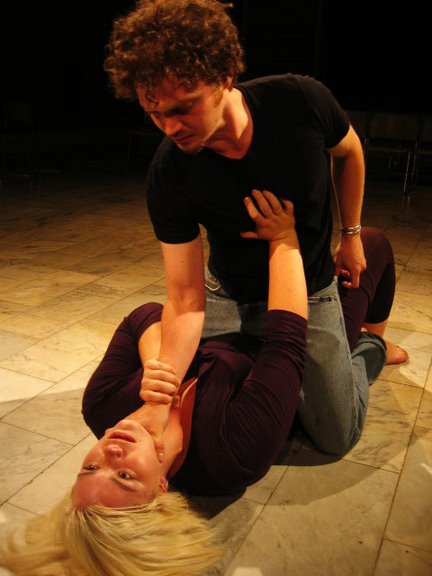Theater Review: A Mild FeverFest 08
By Bill Marx
Now in its third year under the watchful eye of the admirable Whistler in the Dark Theatre, FeverFest presents a selection of Boston’s fringe groups in an evening of short performances, a sort of theatrical tasting event billed as a round up of “explosive work by vital young companies.” Tonight will be the fest’s final performance; those who support the idea of alternative theater, those who root for more than the usual showbiz bosh should attend. These companies say they want to break boundaries: they must build an audience that will give them the financial and spiritual sustenance they need to perform that invaluable service.

But don’t expect to be challenged, provoked, titillated, or pissed off this time around. The six companies roll out a lineup of resolutely genial pieces that are amiably surreal, sweet-tempered and oh-so–pleasant, bouncy and comfortably entertaining. In other words, nothing in FeverFest 08, in spirit, contradicts the staid-to-the-bone stage seasons of the city’s mainstream establishment theaters. If our fringe troupes aren’t going to take risks, if they aren’t going to embrace this year’s theme for the festival – elemental — than what is the point?
That said, FeverFest offers a painless cornucopia of snippets, with the rebellious companies showing a decided preference for foot-tapping dance/theater. Our culture, runs the cliché, dotes on visuals and music rather than on words – alas, FeverFest obeys that stereotype religiously. Jordan Harrison’s “Four” dovetails music and video images (projected on a large overhead banner) with the amusingly skittery movements of four performers. The visuals are routine, the music pleasant, the claim that the piece intends to “elate and overwhelm” preposterous given America’s routine multimedia overload.
The gulf between promised liberation and meager nerve afflicts many of the pieces, such as Theo Goodell’s “awake/I slept for miles,” Orfeo’s “Martha’s (b)Rainstorm,” and New Exhibition Room’s “Shh! a fragment.” It always puzzles me how the unpredictable unconscious becomes so predictably neat and clean once when it appears on stage. Aside from a nasty activist who becomes violent with a woman who signs his petition, the pieces eschew the dark and the enigmatic, embracing the quirky but forgettable, with the performers generally blurting out non-sequiturs and nonsense. As for attempts at daring statements, reading bits from “Mein Kampf” and “Catch 22” doesn’t cut it outside of an Assisted Living Center. All of these groups think that a multimedia approach in itself is innovative, but that is just the beginning — next comes an unruly imagination and the elemental urge to challenge, rather than placate, audiences.
Whistler in the Dark Theatre contributes two scenes from “Love Lies Burning,” a two-character play that appears to be about an imaginary childhood friend (named Hope!) who hangs around well into the adulthood of romance writer Lucy. The latter wants to grow up and marry; the plaintive pleas for survival of the former suggest that the price for Lucy’s maturity will be artistic sterility. There’s nothing new in that premise, though Renée Rossi Donlon brings a jittery charm to Hope.
Imaginary Beast’s staging of Gertrude Stein’s “Three Sisters Who Are Not Sisters: A Melodrama” generally does well with the playlet’s silly put down of conventional murder mysteries, featuring a bunch of kids (Sisters Who Are Not Sisters, Brothers Who Are Brothers) playing a game before bedtime, taking on the interchangeable roles of killer and victims. Still, the sketch would be even more effective if the performers didn’t let on that they were in on the joke. The idea is to catch the homicidal in childhood fantasies, not turn Stein’s satiric squib into a no-holds-barred farce.
The final piece in FeverFest is a low temperature comedy that borders on sit-com from Mill 6 Collaborative. Two neighbors, a man and a woman, step out at night and stumble into some small misunderstandings until the majesty of the stars bring them to their awed senses. The scene ends with a recording of “Starry Starry Night” – what kind of docile fringe is this?
Given the worsening economic situation, the city’s mainstream stage companies will be taking fewer chances with programming than ever before, if that is possible. Expanded marketing departments and PR budgets will be dedicated to making eminently safe fare sound fresh and exciting. This depressing state of affairs makes Boston’s fringe troupes all the more necessary – these companies don’t have to gasp for artistic air in a sealed commercial bubble. But FeverFest suggests that our fringe companies aren’t accepting their freedom to fail in interesting ways, to explore controversial topics, from the political to the personal, that conventional theaters flee in panic. Next summer let’s hope FeverFest boils over.
Tagged: Boston-theater, Featured, FeverFest, Mill-6-collaborative, Orfeo, Persona Non Grata, The-New-Exhibition-Room, Theater, fringe, imaginary-beasts
